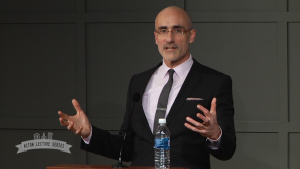


There’s a lot of buzz in the blogosphere on Mark Steyn’s “It’s the Demography, Stupid”, which appears in today’s and is originally published in the January 2006 issue of The New Criterion.
As usual, Steyn has many excellent observations about our present crises, but this article is a more extended look than his op-eds. Some highlights:
The design flaw of the secular social-democratic state is that it requires a religious-society birthrate to sustain it. Post-Christian hyperrationalism is, in the objective sense, a lot less rational than Catholicism or Mormonism.
That’s what the war’s about: our lack of civilizational confidence. As a famous Arnold Toynbee quote puts it: “Civilizations die from suicide, not murder”–as can be seen throughout much of “the Western world” right now. The progressive agenda–lavish social welfare, abortion, secularism, multiculturalism–is collectively the real suicide bomb.
We’re pretty much awash in resources, but we’re running out of people–the one truly indispensable resource, without which none of the others matter. Russia’s the most obvious example: it’s the largest country on earth, it’s full of natural resources, and yet it’s dying–its population is falling calamitously.
Yet, even by the minimal standards of these wretched precedents, so-called post-Christian civilizations–as a prominent EU official described his continent to me–are more prone than traditional societies to mistake the present tense for a permanent feature. Religious cultures have a much greater sense of both past and future, as we did a century ago, when we spoke of death as joining “the great majority” in “the unseen world.” But if secularism’s starting point is that this is all there is, it’s no surprise that, consciously or not, they invest the here and now with far greater powers of endurance than it’s ever had. The idea that progressive Euro-welfarism is the permanent resting place of human development was always foolish; we now know that it’s suicidally so.
And that’s just a sampling.
I think Steyn’s right on just about all his points, but I also know that demographics is a very hard field to predict much beyond the space of one generation. Is there anything that rules out a baby boom among young European Christians 30 years from now? Have there not been popular revivials or awakenings throughout the 2,000-year history of Christianity, often taking place in the midst of much civilizational decay? Or are Pope Benedict and others simply wasting their time?
Steyn addresses many issues central to the Acton Institute’s mission; it’d be a real shame if we couldn’t have a lively discussion over his piece. Let’s get one started, and maybe Hugh Hewitt will take notice.









